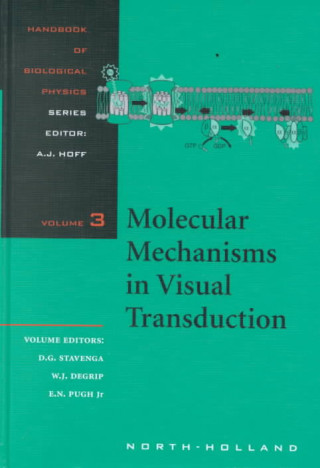
Delivery
Shopping guide





Doesn't suit? No problem! You can return within 30 days
 Gift voucher
any value
Gift voucher
any value
You won't go wrong with a gift voucher. The gift recipient can choose anything from our offer.
Molecular Mechanisms in Visual Transduction
 English
English
 512 b
512 b
 Delivery to Austria
Delivery to Austria
30-day return policy
You might also be interested in


Molecular mechanisms in visual transduction is presently one of the most intensely studied areas in the field of signal transduction research in biological cells. Because the sense of vision plays a primary role in animal biology, and thus has been subject to long evolutionary development, the molecular and cellular mechanisms underlying vision have a high degree of sensitivity and versatility. The aims of visual transduction research are first to determine which molecules participate, and then to understand how they act in concert to produce the exquisite electrical responses of the photoreceptor cells. Since the 1940s, we have known that rod vision begins with the capture of a quantum of energy, a photon, by a visual pigment molecule, rhodopsin. As the function of photon absorption is to convert the visual pigment molecule into a G-protein activating state, the structural details of the visual pigments must be explained from the perspective of their role in activating their specific G-proteins. Thus, chapters 1-3 of this handbook extensively cover the physico-chemical molecular characteristics of the vertebrate rhodopsins. Following photoconversion and G-protein activation, the phototransduction cascade leads to modifications of the population of closed and open ion channels in the photoreceptor plasma membrane, and thereby to the electrical response. The nature of the channels of vertebrate photoreceptors is examined in chapter 4, and chapter 5 integrates the present body of knowledge of the activation steps in the cascade into a quantitative framework. Once the phototransduction cascade is activated, it must be subsequently silenced. The various molecular mechanisms participating in inactivation are treated in chapters 1-4 and especially, chapter 5. Molecular biology is now an indispensable tool in signal transduction studies. Numerous vertebrate (chapter 6) and invertebrate (chapter 7) visual pigments have been characterized and cloned. The genetics and evolutionary aspects of this great subfamily of G-protein activating receptors are intriguing as they present a natural probe for the intimate relationship between structure and function of the visual pigments.
About the book
 English
English
Categories


 Contact
Contact How to shop
How to shop

































